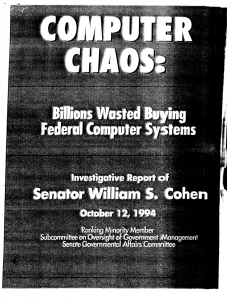Why do government systems fail?
That is essentially the question raised by MSNBC Morning Joe host Joe Scarborough following word that IRS data got hacked.
MSNBC’s Morning Joe on government IT problems
The short but exceedingly provocative discussion that followed spurred me to think: How would I answer that question? What are the big obstacles to success of government systems?
Scarborough asked why “our federal government seems to be stuck in the 1980s when it comes to IT… it’s not just HealthCare.gov but so many other attempts to bring the government into the 21st century … We have Silicon Valley — this is one thing that we are on the cutting edge across the world.”
Steve Rattner, former head of Obama Auto Task Force. Wall Street financier. Contributing Writer to NY Times Op-Ed. Morning Joe Economic Analyst and one of the guests on Morning Joe, suggested that government doesn’t have enough accountability.
“It’s a mix of things,” Rattner said. “The government is the government. It doesn’t operate like the private sector.”
Rather went on to argue that government “doesn’t have the same level of accountability. It doesn’t have the same ability to manage.” And then he notes that we have been cutting back on expenditures over the years.
Scarborough balked at the riff on budget cutting. (I argue below that the situation is much more complex than the partisan crib notes — fund vs cut — make it out.)
To start, I don’t fully buy the premise that failure is unique to government. The fact is big systems are complicated — and the size of government systems make them particularly complex.
Furthermore I don’t believe there are more failures in the government than in the private sector. Mirroring the IRS case, there have been hacks of private sector systems — we all remember Target… Sony… Home Depot or one of a score of health insurers or American Airline’s reservation system didn’t spur questions about why the private sector can handle IT projects. Again, these systems are difficult.
But it seems to me that part of the Morning Joe discussion was preposterous and yet accurately represents beliefs that many people have of the problems facing government. Again, the discussion was short so they didn’t go into it in great detail. But I am a bit baffled by Rattner’s suggestion that government doesn’t have enough accountability. To me, it is the contrary. The problem isn’t a lack of accountability. It is that there is so much accountability that then leads to no accountability. In most cases, there is so much oversight that it actually becomes an impediment to getting the job done — and some of that oversight is often less than helpful and only comes after the fact and is more about grandstanding than true oversight.
Beyond that, the government lacks clear lines of authority so there is no one person that is responsible person for leading a program. Who is responsible for any government program — the agency secretary? deputy secretary? OMB? a lawmaker in Congress? a subcommittee in Congress?
Furthermore the layers of oversight have spurred a culture that is so risk adverse that government keeps doing the same thing over and over again whole expecting different results. In fact the oversight needs to be focused and effective.
Furthermore Rattner suggestion that Feds simply can’t manage also just seems off target. To the contrary — given the situation and circumstances under which we expect these highly complex programs to be managed, I think government managers are some of the best in the world. (Imagine a private sector organization where you may or may not get your funding until anywhere from three- to six-months into the year… and, by the way, you have to spend it by the end of that fiscal year… and then there are all kinds of odd entanglements that are connected to that spending by lawmakers who are looking to protect their own turf… and, by the way, in the midst of all that, we may just shut the organization down for awhile. Again, the argument that government managers can’t manage seems specious. To the contrary, they’ve managed spectacularly well. Unfortunately they have had to get exceptionally good at managing chaos that is outside of their control.)
Some of the best insights are 20 years old — a October 1994 report done by then Sen. William Cohen (R-Maine) titled Computer Chaos: Billions Wasted Buying Federal Computer Systems. [PDF — and a bad PDF at that… An aside: Some of the authors of that report, Paul Brubaker and William Greenwalt have written about it more recently, although they pretty much say that the 20-year-old report got it mostly correct… We just haven’t really done much about it.]
If somebody were to ask me about the problems facing government IT, here is my list:
- Budgets – timing: It has been years since Congress passed a budget even close to the October 1 start of the federal government’s fiscal year. To the contrary, in many years, the budget has been fraught with some kind of showdown
- Budgets – lack of priorities: Budgeting, at its best, is a process of setting priorities. The federal budget doesn’t set priorities. It doesn’t decide that we should do this activity or program — and, by extension, not do another program. Part of this is the challenge of our form of government with its checks and balances. But what we end up doing is trying to do everything, which means real priorities get neglected. It isn’t about the fairly boring fund vs cut partisan debate. It is more about deciding what programs matter more than others, and then funding those programs in a way they can accomplish their mission.
- Procurement: I keep stressing this but the system is just broken. It takes way too long and often doesn’t result in something that provides the desired results. Thee are a host of reasons for this — I’ve suggested that we start with a FAR do-over. But wherever we start, procurement and acquisition seem like a major obstacles.
- HR: Again, the process is just broken. Agencies can’t hire efficiently. Agencies can’t fire efficiently. And we have a civil service system that is some 60-years-old. The Partnership for Public Service did a remarkable public service publishing its recommendations for modernizing the civil service system. [GovLoop DorobekINSIDER on this subject: My initial take when the Partnership’s recommendations came out; plus The Partnership’s Tom Fox; and The Partnership’s Tim McManus.]
So this is the whiny and somewhat defensive list — most of the items on this list feds can’t do anything about… they are above their pay grade. But they are some of the biggest hurdles to effective management. We should probably also make a list that includes what people can do — today — to help the situation.
What is on your list — either the whiny list or the helpful list…

